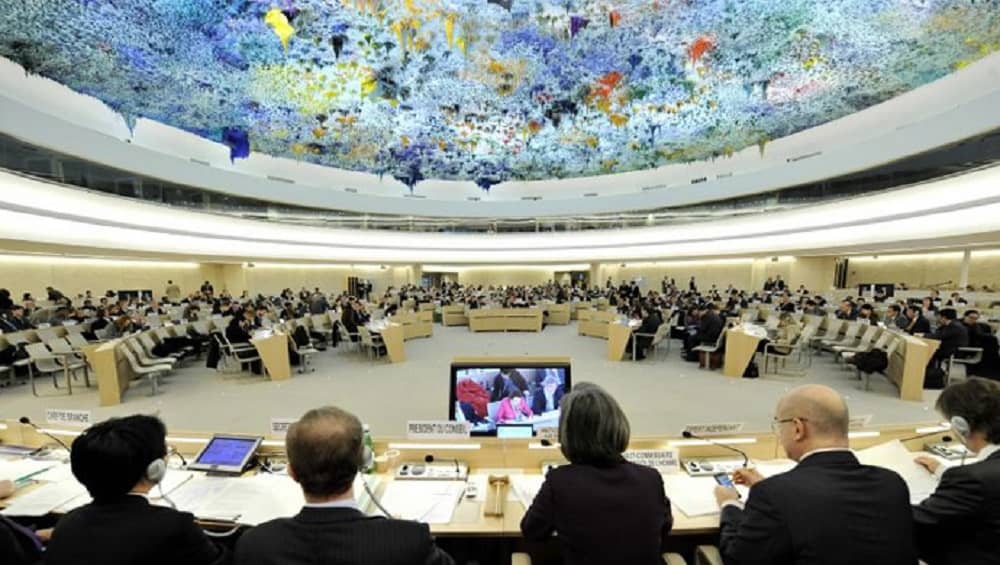Facebook
Twitter
LinkedIn
Pinterest
Reddit
Email
Print
 The United Nations Human Rights Council in session in Geneva
The United Nations Human Rights Council in session in Geneva
Three-minute read
In late October 2025, senior United Nations officials and the European Union issued urgent warnings over what they described as a sharp escalation in state repression and executions in Iran following the June 2025 attacks by Israel and the United States. The clerical regime, they said, has responded not by easing emergency measures but by deepening the use of capital punishment, surveillance, mass arrests, and transnational intimidation.
UN Special Rapporteur: “Executed to Instill Fear, Not Justice”
Mai Sato, the UN Special Rapporteur on the situation of human rights in Iran, presented her latest report to the UN General Assembly on 31 October 2025. She warned that the end of the 12-day military escalation in June—during which more than 1,100 civilians were killed and over 5,600 injured—had brought no relief to Iranian society.
“External aggression has fueled deeper internal repression,” Sato said. “The Iranian people’s rights to life and liberty are under unprecedented threat.”
Sato reported that over 1,000 executions have been documented as of September 2025, the highest number recorded in years and a continued surge from 2024. She noted that only about 8% of executions are announced publicly, calling the practice “a deliberate policy of fear and retribution.” Many executions, she said, follow unfair trials, forced confessions, or vague national security charges such as “acting against national security” or “corruption on earth.”
She also reported mass deportations of Afghan nationals, expanded espionage laws restricting expression, and intensified crackdowns on civil society, journalists, women activists, and ethnic and religious minorities.
Sato called on Iran to immediately halt executions, establish a moratorium, and permit international monitoring of prisons. “This is a pivotal moment for Iran to rebuild trust with its people,” she said.
📢 “We are witnessing widespread and sustained violations of the right to life.”@UKUN_NewYork says Iran’s use of the death penalty has reached an extraordinary level, adding that the UK 🇬🇧 stands against the new espionage law which seeks to broaden crimes punishable by death. pic.twitter.com/YCong99wnV
— M. Hanif Jazayeri (@HanifJazayeri) October 31, 2025
EU: Executions Reach a “New Record High”
During the UN General Assembly’s Third Committee session on 30 October 2025, the European Union delegation stated that Iran is now averaging three to four executions per day. The EU said the year 2025 has already reached a record number of executions and condemned the clerical regime’s use of the death penalty “in all cases and under all circumstances.”
The EU also raised alarm over transnational repression, noting that Iranian dissidents and journalists have been targeted inside EU territory through surveillance and intimidation.
“The EU demands the immediate and unconditional release of all arbitrarily detained persons,” the statement said, including dual nationals and foreign citizens held for political leverage.
Amnesty International: Political Prisoners at Imminent Risk
On 29 October 2025, Amnesty International urged the immediate suspension of executions, warning that numerous prisoners—including Manouchehr Falah—face imminent execution after what the organization described as politically motivated and unfair trials.
“Authorities must halt all executions and grant fair retrials in accordance with international standards,” Amnesty stated.
Today (30 October) at 3-6pm NY time, I’ll be presenting my report on the human rights situation in the Islamic Republic of Iran to the UN General Assembly.
📄 Full report: https://t.co/F4AEyVRQPp
Farsi version: https://t.co/ejptUBdUEX
📺 Watch live: https://t.co/3XRncTnmQz
— Mai Sato (@drmaisato) October 30, 2025
International Commission: Potential Crimes Against Humanity
Sara Hossain, Chair of the Independent International Fact-Finding Mission on Iran, told the UN General Assembly on 31 October 2025 that the scale and method of executions may constitute crimes against humanity.
She said the commission has documented “systematic violations of the right to life,” including executions without notifying families, denial of funeral rights, and secret burials—as in the case of Kurdish political prisoner Hamid Hosseinnejad Heydranlou, executed on 20 April 2025, whose burial location was withheld.
“The pattern is deliberate and coordinated,” Hossain said. “Those responsible—including judicial authorities—may be held individually accountable.”
🚨 UPDATE, 30 Oct 2025: The UN Fact-Finding Mission on Iran urges Iran to commute Zahra Tabari’s death sentence & release her immediately
Zahra’s only crime? Possessing a cloth with the words “Woman, Resistance, Freedom” written on it@BobRae48 @drmaisato #StopExecutionsInIran https://t.co/MNEj5pES4u pic.twitter.com/7KIJJR7bEa
— M. Hanif Jazayeri (@HanifJazayeri) October 30, 2025
A Turning Point
International human rights bodies emphasized that the current trajectory is not temporary or exceptional, but reflects a structured state strategy to suppress dissent, deter protest, and reassert control after years of nationwide unrest and economic decline.
Sato concluded that the current wave of executions represents “a deliberate policy of fear and retribution,” rather than the application of justice.
